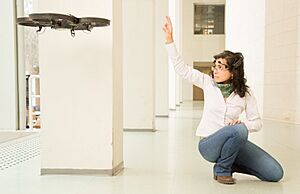Marta Molinas facts for kids
María Marta Molinas Cabrera was born in 1968. She is an amazing electrical engineer from Paraguay who studied in Japan. Today, she works as a professor in Norway at the Norwegian University of Science and Technology (NTNU). She teaches about engineering cybernetics, which is all about how we can control machines and systems.
Controlling Things with Your Mind
Professor Molinas does really cool research! She studies how to make power electronics work better and more steadily. Power electronics are like the "brains" of many electrical devices, helping to control how electricity flows. She also looks at "harmonics," which are like extra, unwanted waves in electrical power that can cause problems.
But one of her most exciting areas of research is about using your brain! She works with signal processing for electroencephalography (EEG). This means she studies the electrical signals your brain makes. Her work has led to incredible systems where people can control things like drones just by thinking! Imagine flying a drone with your thoughts!
She hopes to use her research on brain signals to do even more. Not only can she "read" information from brains, but she also wants to create new ways to help people. This could include therapies for things like attention problems, sleep issues, and even pain.
Her Journey to Engineering
Marta Molinas grew up in Argentina and Paraguay. She started her engineering journey by getting a diploma in electromechanical engineering from the Universidad Nacional de Asunción in 1992.
She then traveled to Japan to continue her studies. In 1997, she earned her master's degree in engineering from the University of the Ryukyus. Her master's project was about making power systems more stable. She then went on to get her doctorate (a very high degree) from the Tokyo Institute of Technology in 2000. Her doctorate research was about controlling power systems using something called "phase angle regulation."
After finishing her studies, she worked as a guest researcher in Italy and then as a postdoctoral researcher at NTNU in Norway. In 2008, she officially joined the teaching staff at NTNU, where she is now a professor.
Special Achievements
Professor Molinas has received some important honors for her work. She is a member of the Royal Norwegian Society of Sciences and Letters, which is a group of very smart people in Norway who are recognized for their scientific achievements.
She was also chosen as an IEEE Fellow in 2023. The IEEE is a huge organization for engineers, and being an IEEE Fellow is a big deal! It means she is recognized for her important contributions to how we model and make power electronics stable.
 | Frances Mary Albrier |
 | Whitney Young |
 | Muhammad Ali |


